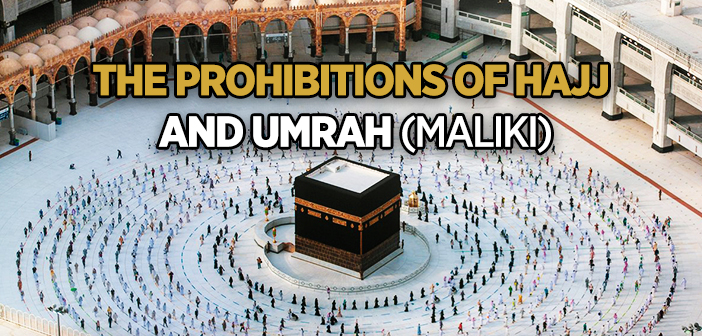What are the prohibitions of hajj and umrah? What are the rules of hajj and umrah?
There are prohibited actions from a religious standpoint for those who have gone into the ihram for the purpose of hajj or umrah. The implementation of these prohibited actions are called ‘’jinayatul hajj’’. There are punishments as a consequence for not following these prohibitions. The thing that is needed due to these punishments are generally called ‘’fidya’’.
The fidya changes in accordance with the nature of the prohibition that was implemented. Some of these require the slaughtering of a sheep or goat, some of them require the slaughtering of a buffalo or a camel. Sadaqa is given for some of these jinayats. In the way that there is no difference in knowing and not knowing whether the implemented actions is a jinayat or not; there is no difference when they are implemented intentionally, mistakingly, by forgetting or by being forced to do it.
A) Circumstances That Require A Badana (To Slaughter A Buffalo Or Camel)
- To engage in sexual intercourse before coming out of the ihram,
- To carry out the visitation tawaf when one is in a state of janabah, is menstruating or experiencing postnatal bleeding.
B) Circumstances That Require The Dam (To Slaughter A Sheep Or Goat)
These are jinayats concerning not implementing one of the wajibs of hajj, delaying them, spoiling the umrah or not abiding by the ihram prohibitions. These jinayats are two parts:
1- Jinayats concerning not implementing one of the wajibs of hajj or not implementing them on time:
Passing miqat without the ihram, to abandon the sa’y altogether or to not carry out at least four of its shawts, to not do the muzdalifa wuquf without having a valid excuse, to not stone the shaitan or not throwing more than half of the stones that are required to be thrown in a day, to not carry out the last three shawts or just one shawt of the visitation or umrah tawaf, for the hajjis coming from outside the miqat to abandon the wada tawaf or for them not to carry out most of it as in four or more shawts, to carry out the visitation and umrah tawaf without the wudhu, or to carry out the wada or qudum tawaf while in a state of janabah, leaving Arafat before the sun sets, carrying out the visitation tawaf after the days of eid without having an excuse, to shave oneself in order to get out of the ihram somewhere outside of the Haram area or after the days of eid and not following the order of hajj.
2- Jinayats concerning the violation of the ihram prohibitions:
Putting on a pleasant scent on the whole of an organ in the one go, to put on oil or to paint henna on oneself for decoration, to wear a piece of clothing, socks or covered shoes for a whole day or for the whole night, to cover the head and face, to shave the hair, beard or another organ of the body, to cut all the nails of one hand or foot, to engage in sexual intercourse after shaving and coming out of the ihram but before carrying out the visitation tawaf or implementing actions that may lead to sexual intercourse while in the ihram.
C) Circumstances In Where It Is Required to Give As Much Sadaqa as The Fitr Sadaqa
These are circumstances in where it is needed to give sadaqa; putting on a pleasant scent or oil on a part of any organ, shaving the head, beard or to shave less than a fourth of the head while in ihram, shaving someone else, wearing stitched clothing and shoes that cover the heels or to cover the head for a whole day or less than one full night, to cut a part of the nails of one hand or foot, carrying out the qudum, wada or nafilah tawaf without wudhu, leaving the shawts after the fourth shawt of the sa’y or the wada tawaf, throwing less than the needed amount of stones at jamrahs.
These circumstances are haram for everyone, whether they are in ihram or not; to hunt prey of the Haram area, to cut or pull out trees and weeds that grow freely on its own and that are not dried up. The person who cuts or pulls out trees or plants that grow on their own in the Haram area, must compensate for this circumstance by giving sadaqa to the poor. A punishment is not required for pulling out trees and plants that were planted by people. The person who hunts prey of the Haram area, must give sadaqa in the amount of the value of the prey.
Ihsar, is when the person who wears the ihram for the purpose of hajj or umrah, is unable to complete the Arafat wuquf and tawaf. Obstacles that prevent one from carrying out the journey of hajj or the tawaf and waqfa such as coming across an enemy, being imprisoned, sickness, losing money are all reasons for the ihsar.
The person who is prevented from carrying out the tawaf in Arafat and tawaf with the reason of ihsar, will come out of the ihram in the place where they are prevented. It is not needed for this person to slaughter the hady qurban, but if they have a hady qurban next to them, they will cut it in the place they were prevented.
Source: Fiqh1 (According To The Maliki School Of Islamic Law), Erkam Publications





